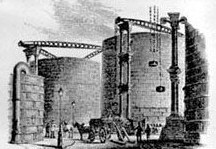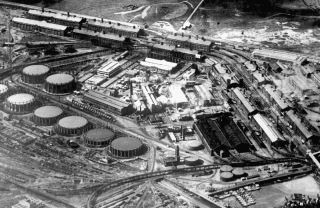 Westminster Gasworks
Westminster Gasworks
circa 1840
 Becton Gasworks
Becton Gasworks
circa 1945
With the establishment of the Gas Light & Coke Company other undertakings were launched in London and beyond - the first provincial town to be lit by gas was Preston in 1816. Many undertakings obtained an Act of Parliament to limit the liability of the shareholders and to be able to lay pipes in the public highway. Most undertakings were for the supply of coal gas.
From the early 1820's undertakings were formed to manufacture gas from oil (usually whale) but this was much more expensive and most obtained parliamentary consent to change to coal as the raw material.
In the 1820's, Parliament had been disposed to granting monopoly supply rights for areas designated in the gas Acts; from 1830 competition was encouraged and with oil gas companies converting to coal many areas had two gas suppliers, some three and very occasionally four ! Frequently there was poor service and additional undertakings were formed to improve the service to the customer. By the middle of the century, the general dissatisfaction with the actions of many undertakings led to the passing of Acts to regulate the industry - Gas Works Clauses Acts 1847, 1871; Sale of Gas Act 1859.
Manchester Police Commissioners, with powers to light the town, installed a small gas plant at the police station. This was taken over by Manchester Corporation in 1843 and became the first municipal undertaking. By 1875 there were 66 such undertakings.
For the majority of this period, gas lighting was seen as a commercial and industrial service. Streets, shops offices and factories might be lit by gas but it was not generally used in the domestic situation. While attempts had been made to encourage the use of gas for cooking with few exceptions it was only used for lighting. The invention of the aerated burner by Bunsen in 1855 was of major significance in the development of the use of gas for other purposes.